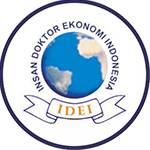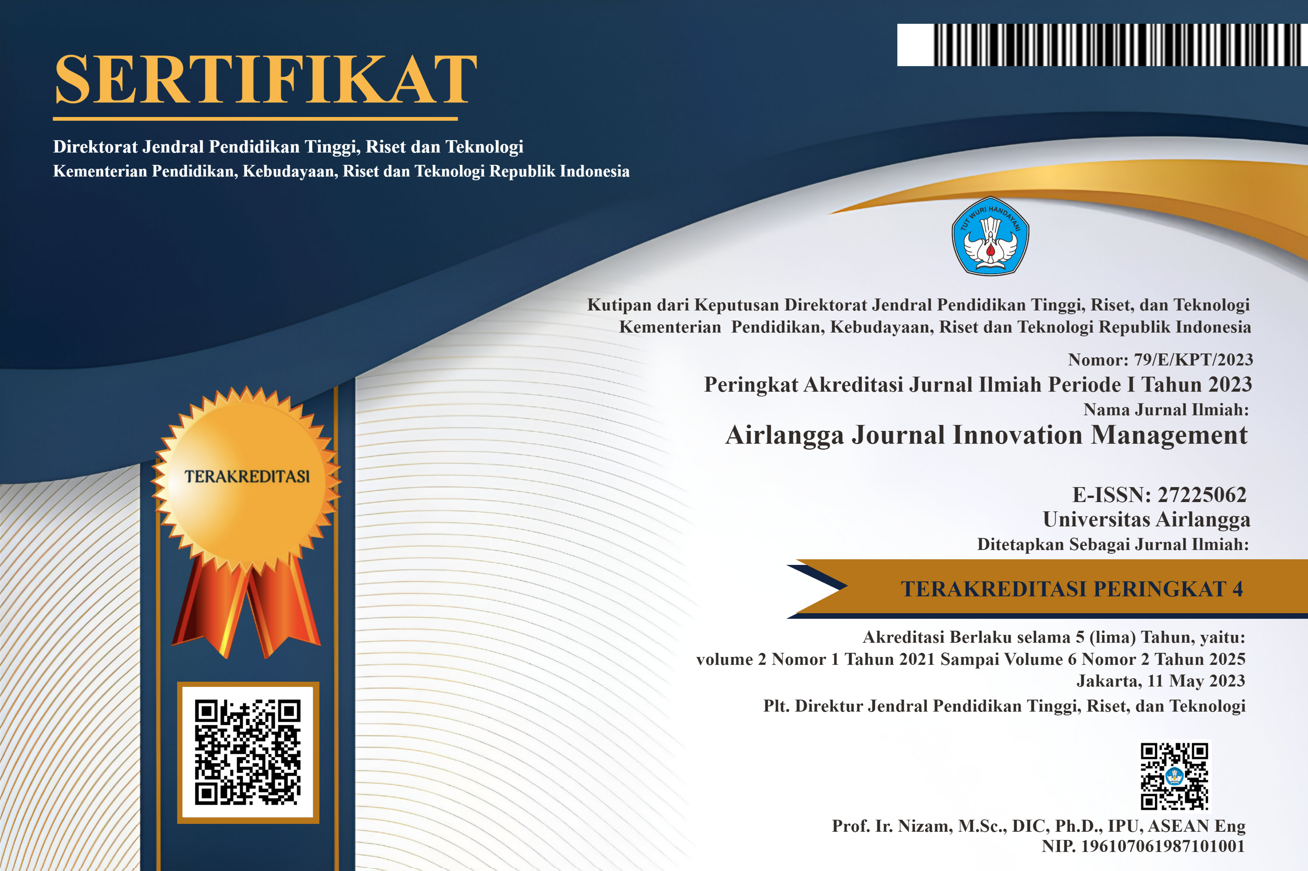Transformational Leadership in Green Human Resource Management Practice: A Systematic Literature Review
Downloads
This article aims to examine the role of transformational leadership in the implementation of Green Human Resource Management (Green HRM) and its contribution to organizational environmental sustainability. The urgency of this study lies in the growing demand for organizations to integrate sustainability principles into their human resource practices. Using a Systematic Literature Review (SLR) approach, 11 articles were screened and analyzed from reputable databases, including Scopus and ScienceDirect. The findings reveal that Green HRM encompasses recruitment, training, performance management, and compensation processes that are grounded in environmentally friendly values. However, its successful implementation is significantly influenced by transformational leadership. Transformational leaders play a pivotal role in shaping pro-environmental organizational culture, motivating employees to adopt green behaviors, and ultimately enhancing environmental performance and long-term sustainability. In addition, the study highlights that the effectiveness of Green HRM implementation is not solely determined by internal leadership, but also by external factors such as government policy support, stakeholder engagement, and collective awareness of environmental issues. This study concludes that the integration of Green HRM and transformational leadership represents a key strategic approach to building competitive, sustainable organizations. Theoretically, it contributes to the growing body of literature on leadership and sustainable HR practices. At the same time, practically, it provides guidance for managers and policymakers to align leadership styles with green initiatives to achieve long-term environmental goals.
Adirestuty, F. (2019). Customer-perceived value in creating customer satisfaction and revisit intention in sharia hotels. Journal of Islamic Monetary Economics and Finance, 5(2), 367–386.
Adirestuty, F. (2023). Prioritas Strategi Pengembangan Industri Halal di Kabupaten Tasikmalaya: Pendekatan Analytical Hierarchy Process. Jurnal Edukasi (Ekonomi, Pendidikan Dan Akuntansi).
Adirestuty, F., Ramdiana, M. R., Rahayu, A., Monoarfa, H., binti Bahtar, A. Z., bin Ahmad, Z., & bin Mahmud, N. (2021). Are Non-Muslim Consumers Interested in Foods with the Halal Label? 5th Global Conference on Business, Management and Entrepreneurship (GCBME 2020), 695–699.
Adirestuty, F., Ratnasart, R. T., Wardhana, A. K., Miraj, D. A., & Battour, M. (2025). Gastronomy of religious tourism: Overview and future research agenda. Geo Journal of Tourism and Geosites, 58(1), 188–199.
Alfiyah, A., Yuliawati, S., & Utami, F. (2024). Humans as Caliphs on Earth Environmental Responsibility in Islamic Perspective. Journal Kajian Keislaman, 1(2), 1–6. https://doi.org/10.56566/jks.v1i2.243
Alimusa, L. O., Herianingrum, S., Adirestuty, F., & Hakim, A.-A. A. A. (2025). Determinants of Zakat compliance behaviour and future direction: a systematic literature review. International Journal of Law and Management.
Ansori, A., Qosim, N., & AR, Z. T. (2022). Financial Literacy dan Niat Berinvestasi Bidang Properti pada Masyarakat Ekonomi Menengah. Proceedings of Annual Conference on Community Engagement, 3, 203–216.
Bangwal, D., Chaudhary, A., Kumar, R., Oberoi, S. S., & Kumar, V. (2025). Green HRM, employee pro-environmental behavior, and environmental commitment. Acta Psychologica, 258(December 2024), 105153. https://doi.org/10.1016/j.actpsy.2025.105153
Dahinine, B., Laghouag, A., Sahel, W. Ben, Guendouz, T., & Bennaceur, A. (2023). The impact of green human resource management on green pharmaceutical supply chain management practices. Uncertain Supply Chain Management, 11(3), 893–902. https://doi.org/10.5267/j.uscm.2023.5.009
Faeni, D. P., Oktaviani, R. F., Riyadh, H. A., Faeni, R. P., & Beshr, B. A. H. (2025). Green Human Resource Management and Sustainable Practices on Corporate Reputation and Employee Well-being: A model for Indonesia’s F&B industry. Environmental Challenges, 18(November 2024), 101082. https://doi.org/10.1016/j.envc.2025.101082
Fauzi, Q., Ulfah, U., & Wijayanti, I. (2024). Ethical challenges in transportation: A study on the implementation of Islamic business values. Al-Uqud: Journal of Islamic Economics, 8(2).
Guerra-Lombardi, V., Gutiérrez-Taño, D., Hernández-Martín, R., & Padrón-Fumero, N. (2025). Green Behavioural Intention and Behaviour of Hotel Employees: Mediation Roles of Customers, Coworkers, Supervisors, and Corporate Attitudes. Sustainability (Switzerland), 17(13), 1–26. https://doi.org/10.3390/su17135928
Gupta, A., & Jangra, S. (2024). Green human resource management and work engagement: Linking HRM performance attributions. Sustainable Futures, 7(February), 100174. https://doi.org/10.1016/j.sftr.2024.100174
Hardiansyah, K., & Adirestuty, F. (2021). Islamic Business Ethics: The Key to Success in Family Business (Case Study at Green Hotel Ciamis). Review of Islamic Economics and Finance, 4(2), 81–98.
Harisinta, T. (1921). Green Transformational Leadership in Improving In-Role and Extra-Role Performance: Green Human Resource Management as Mediation. Nature, 107(2703), 787–788. https://doi.org/10.1038/107787a0
Humaidi, M. W., Hariyanto, & Azizah, M. (2024). Green philanthropy: Islamic activism on Indonesia’s environmental democracy. Ijtihad: Jurnal Wacana Hukum Islam Dan Kemanusiaan, 24(2), 167–191. https://doi.org/10.18326/IJTIHAD.V24I2.167-191
Ichsan, R. N., Santosa, S., Shara, Y., & Liriwati, F. Y. (2020). Investigation of strategic human resource management practices in business after covid-19 disruption. PalArch’s Journal of Archaeology of Egypt/Egyptology, 17(7), 13098–13110.
Irawati, A., & Rizky, G. (2024). The Influence of Green Human Resource Management on Competitive Advantage : The Role of Green Innovation factory laborers , which has led to the growth of manufacturing industries and the. JRABA Jurnal Riset Akuntansi Dan Bisnis Airlangga, 9(2), 120–223. https://doi.org/https://doi.org/10.20473/jraba.v9i2.61809
Juliana, J., Kartika, A. T., Adirestuty, F., Marlina, R., Utomo, Y. T., & Inomjon, Q. (2025). Does the entrepreneurial intention variable moderate muslimah’s decision to become an entrepreneur. International Review Of Community Engagement, 1(2), 111–134.
Karimi, S., Ahmadi Malek, F., Yaghoubi Farani, A., & Liobikienė, G. (2023). The Role of Transformational Leadership in Developing Innovative Work Behaviors: The Mediating Role of Employees’ Psychological Capital. Sustainability (Switzerland) , 15(2). https://doi.org/10.3390/su15021267
Kissi, E. A., Segbenya, M., & Oti Amoah, J. (2024). Environmental sustainability among workers in Ghana: The role of green human resource management. Heliyon, 10(13), e33380. https://doi.org/10.1016/j.heliyon.2024.e33380
Klein, G. (2023). Transformational and transactional leadership, organizational support and environmental competition intensity as antecedents of intrapreneurial behaviors. European Research on Management and Business Economics, 29(2), 100215. https://doi.org/10.1016/j.iedeen.2023.100215
Kodri, K., Budiwati, N., & Adirestuty, F. (2019). The Effect of Self-Efficacy Mediation to the Influence between Teacher Experience and Teacher Training Towards Technological Pedagogy and Content Knowledge. The International Journal of Business Review (The Jobs Review), 2(2), 121–132.
Lahbar, G. M., Junejo, D., & Bhatti, A. A. (2023). Mediating Effect of Green Human Resource Management (GHRM) and Organizational Agility (OA) On Firm Environmental Performance (FEP): By Applying Quantitative Research Approach. Global Economics Review, VIII(II), 67–83. https://doi.org/10.31703/ger.2023(viii-ii).06
Lubis, I. T., & Shara, Y. (2021). Analisis Pengaruh Kompetensi Sumber Daya Manusia, Transparansi Dan Pemanfaatan Teknologi Informasi Terhadap Penyusunan Anggaran Pendapatan Dan Belanja Daerah Di Kota Medan. Jurnal Ilmiah Simantek, 5(3), 144–153.
Mendo, A. Y., Singh, S. K., Yantu, I., Hinelo, R., Bokingo, A. H., Dungga, E. F., Juanna, A., Wardhana, A. K., Niroula, B., & Win, T. (2023). Entrepreneurial leadership and global management of COVID-19: A bibliometric study. F1000Research, 12(31), 31.
Monoarfa, H., Nisa, S. K., & Adirestuty, F. (2021). The Role Of Work Motivatiom In Moderating The Effect Of Compensation On Work Productivity Of Amil Zakat (Study at the Amil Zakat Institute in Bandung City). TSARWATICA (Islamic Economic, Accounting, and Management Journal), 2(2), 38–47.
Nizar, M., Dzikrulloh, N. Q., & Ansori, R. (2019). Mosque Based Economic Empowerment Model to Overcome Poverty in Indonesia. CIFET 2019: Proceedings of the 1st Conference on Islamic Finance and Technology, CIFET, 21, 88.
Njaramba, F. (2024). Transformational leadership in a crisis: Dimensional analysis with psychological capital. Heliyon, 10(16), e35900. https://doi.org/10.1016/j.heliyon.2024.e35900
Noor, J., Tunnufus, Z., Handrian, V. Y., & Yumhi, Y. (2023). Green human resources management practices, leadership style and employee engagement: Green banking context. Heliyon, 9(12), e22473. https://doi.org/10.1016/j.heliyon.2023.e22473
Perez, J. A. E., Ejaz, F., & Ejaz, S. (2023). Green Transformational Leadership, GHRM, and Proenvironmental Behavior: An Effectual Drive to Environmental Performances of Small- and Medium-Sized Enterprises. Sustainability (Switzerland), 15(5). https://doi.org/10.3390/su15054537
Qalati, S. A., Zafar, Z., Fan, M., Limón, M. L. S., & Khaskheli, M. B. (2022). Employee performance under transformational leadership and organizational citizenship behavior: A mediated model. Heliyon, 8(11).
Qosim, N. (2016). Menjajaki Potensi Islamisasi Ilmu Ekonomi. EL-BANAT: Jurnal Pemikiran Dan Pendidikan Islam, 6(2), 129–142.
Qosim, N., & Buhori, I. (2022). Peran Pemerintah dalam Bidang Ekonomi menurut Muhammad Baqir ash-Shadr. JIESP: Journal of Islamic Economics Studies and Practices, 1(2), 193–207.
Qosim, N., Ratnasari, R. T., Wardhana, A. K., Fauziana, H., & Barkah, T. T. (2023). Eight Years of Research Related to the Green Sukuk in the Global Stock Exchange Market to Support the Implementation of SDG: A Bibliometric Review. Journal of Islamic Economic and Business Research, 3(2), 161–180.
Ramachandaran, S. D., Vasudevan, A., Balakrishnan, R., Nagaraj, S., & Thinakaran, R. (2024). The impact of green human resource management practices on employee’s job performance. International Journal of Management and Sustainability, 13(3), 506–522. https://doi.org/10.18488/11.v13i3.3828
Ren, Q., Li, W., & Mavros, C. (2024). Transformational Leadership and Sustainable Practices: How Leadership Style Shapes Employee Pro-Environmental Behavior. Sustainability (Switzerland), 16(15), 1–13. https://doi.org/10.3390/su16156499
Shang, J. (2023). Transformational Leadership Influences Employee Performance: A Review and Directions for Future Research. Highlights in Business, Economics and Management, 10, 291–312. https://doi.org/10.54097/hbem.v10i.8113
Shara, Y., Kholis, A., & Ikhsan, A. (2024). Pengaruh Intellectual Capital terhadap Kinerja Keuangan pada Bank Syariah di Malaysia Tahun 2019-2022. Owner: Riset Dan Jurnal Akuntansi, 8(2), 1722–1731.
Sheikh, A. A., Shan, A., Hassan, N. M., Khan, S. N., & AbdAlatti, A. (2024). Impact of green human resource management practices on hotels environmental performance: A mediation and moderation analysis. Sustainable Futures, 8(May), 100409. https://doi.org/10.1016/j.sftr.2024.100409
Sitohang, A. M. D., Absah, Y., Harahap, H., & Sibarani, R. (2024). The role of green human resource management in promoting sustainable tourism practices. E3S Web of Conferences, 577. https://doi.org/10.1051/e3sconf/202457702013
Sulistiawan, J., Herachwati, N., & Khansa, E. J. R. (2024). Barriers in adopting green human resource management under uncertainty: the case of Indonesia banking industry. Journal of Work-Applied Management, 17(2), 200–219. https://doi.org/10.1108/JWAM-06-2024-0064
Sumiati, S., Yasri, Y., & Wardi, Y. (2023). The Effect of Green Human Resource Management on Performance of Small and Medium Industries. Calitatea: Acces La Success; Bucharest, 24(194), 296–303. https://doi.org/10.47750/QAS/24.194.33
Suryadi, Y. (2024). THE IMPACT OF TRANSFORMATIONAL LEADERSHIP ON ORGANIZATIONAL PERFORMANCE AND EMPLOYEE MOTIVATION. Transforma Jurnal Manajemen, 108–119.
Susanto, A. A., Suprayitno, A., Zulaikha, S., & Wardhana, A. K. (2025). How Islamic Leadership and Islamic Worldview Play a Role in Restoring a Country’s Economic Glory: Blibliometrical Analysis. Jurnal Transformatif (Islamic Studies), 9(1), 40–56.
Sutiyan, D. R. R. J., Nugroho, K., Suharjianto, & Rhain, A. (2025). Kesalehan Ekologis Dalam Perpektif Qur’an Dan Pengamalannya Pada Institusi Pendidikan Islam Ecological Piety from the Qur’an Perspective and The Implementation in Islamic Educational Institutions. Jurnal Pendidikan Indonesia, 5(1), 2807–3878. https://doi.org/10.59818/jpi.v5i1.1234
Tharanatha, A., Shashidhar, R., Bharath, S., & Nagesh, P. (2023). The Green Behaviour Role in Relationship Amid Green Human Resource Management and Employer Branding in Green Hospitals. Indian Journal Of Science And Technology, 16(14), 1062–1068. https://doi.org/10.17485/ijst/v16i14.247
Tran, N. K. H. (2023). An empirical investigation on the impact of green human resources management and green leadership on green work engagement. Heliyon, 9(11), e21018. https://doi.org/10.1016/j.heliyon.2023.e21018
Uddin, M. N., Nahar, L., Bt Kaseem, S., & Bt Saad, N. (2023). Factors affecting financial literacy among Micro small and medium-sized enterprises (MSMEs) in Bangladesh and Malaysia. 8. Uluslararası Öğrenci Sempozyumu, June, 151–166.
Umair, S., Waqas, U., Mrugalska, B., & Bystrov, Ii. (2024). Linking transformational leadership to green human resource management (GHRM) and employee engagement in green initiatives. International Journal of Sustainable Engineering, 17(1), 1083–1095. https://doi.org/10.1080/19397038.2024.2434703
Weber, P., & Kassab, E. A. (2024). The employee green behavior of green transformational leadership, green human resource management on the sustainable performance. Journal of Infrastructure, Policy and Development, 8(8). https://doi.org/10.24294/jipd.v8i8.4630
Wu, Z. (2020). Ecological Transformation and Man-Machine Symbiosis: A Study on the Relationship between Human and Artificial Intelligence. 37. https://doi.org/10.3390/proceedings2020047037
Younis, Z., & Hussain, S. (2023). Green Transformational Leadership: Bridging the gap between Green HRM Practices and Environmental Performance through Green Psychological Climate. Sustainable Futures, 6(November). https://doi.org/10.1016/j.sftr.2023.100140
Yuliza, Y., & Musa, H. (2025). Building green performance through green HRM and green transformational leadership: The mediation role of green innovation. Asian Management and Business Review, 5(2), 247–261. https://doi.org/10.20885/ambr.vol5.iss2.art1
Yusop, H. M., Adam, A. A., Rahim, A. R. A., Munusami, C., & Hussin, S. A. (2023). Green Human Resource Management and Employee Pro-Environmental Behavior: Environmental Knowledge Best Mediate or Moderate the Relationship? Malaysian Journal of Consumer and Family Economics, 31(November), 757–787. https://doi.org/10.60016/majcafe.v31.28
Copyright (c) 2025 Airlangga Journal of Innovation Management

This work is licensed under a Creative Commons Attribution-NonCommercial-ShareAlike 4.0 International License.
- The journal allows authors to hold copyright without restrictions and retain publication rights without restrictions. The author retains the copyright and grants the first publication rights to the journal, with his work simultaneously licensed under the Creative Commons Attribution-NonCommercial-ShareAlike 4.0 International License (CC BY-NC-SA). This license allows others to share the work with acknowledgment of authorship and initial publication in this journal, provided that the work is not used for commercial purposes and that any derivative works must use the same license.
- Authors may enter into additional contractual agreements for non-exclusive distribution of the journal publication version (e.g., uploading it to an institutional repository or publishing it in book form), while still including acknowledgment of the initial publication in this journal.
- Authors are allowed and encouraged to upload their work online (e.g., in an institutional repository or personal website) before and during the submission process. This can support productive scientific exchanges as well as increase citations to published works.

AJIM by UNAIR is licensed under a Creative Commons Attribution-NonCommercial-ShareAlike 4.0 International License.





















